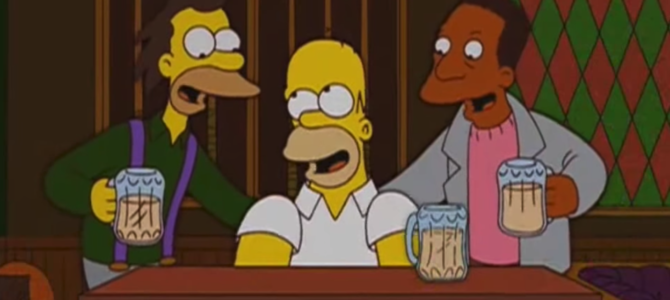“The Simpsons” passed a major television milestone this week, but an interview with one of the show’s voice actors indicate the seeds have also been sown for the show’s demise.
With its 636th episode Sunday, “The Simpsons” passed “Gunsmoke” for the highest number of episodes by a scripted television series this week, although “The Simpsons” had long since passed that show in years on air (“Gunsmoke” aired more episodes per season in its 2 decades on air), and is now in its 29th season.
The milestone, however, came in the middle of an ongoing controversy surrounding one of the show’s long-running characters, Apu Nahasapeemapetilon. Voice actor Hank Azaria indicated in a television interview Tuesday his willingness to “step aside” if the producers of “The Simpsons” wished to retire the character of Apu Nahasapeemapetilon.
Azaria spoke of a controversy tackled in the documentary “The Problem with Apu,” and referenced in an episode of the show this season. The documentary, released last November by Indian-American comedian Hari Kondabolu, focused on the lack of representation of South Asian-American actors in television roles, and the ways in which the Apu character has affected the South Asian community, whether in schoolyard taunts of children called “Apu,” or actors asked to reprise the Apu character’s accent.
Earlier in April, an episode addressed the issues sparked by the documentary. Daughter Lisa — the show’s resident conscience — broke the fourth wall and said, “Something that started decades ago and was applauded and inoffensive is now politically incorrect. What can you do?” Marge responded with, “Some things will be dealt with at a later date,” to which Lisa interjected, “If at all.”
Kondabolu said he found the on-air response to his documentary “sad;” others on Twitter chimed in with similar criticisms. Azaria’s interview last week, in which he offered to retire the Apu character, attempted to defuse those lingering concerns.
Apu is indeed a stereotype — one that powerful Americans have perpetuated. Look no further than Joe Biden, who in 2006 patronized an Indian-American supporter: “In Delaware, the largest growth in population is Indian-Americans, moving from India. You cannot go to a 7-11 or a Dunkin Donuts unless you have a slight Indian accent. I’m not joking.” (No word yet on what Biden thinks of the Apu controversy.)
Of course most characters on “The Simpsons” are stereotypes, though, in one way, shape, or form. Dr. Nick Riviera, also voiced by Azaria, is the actor’s attempt to perform a bad Ricky Ricardo impersonation from “I Love Lucy.” But Azaria, unlike Desi Arnaz, who played Ricardo, does not have Cuban roots. While Kondablou criticized “The Simpsons” for not hiring an Indian-American to portray Apu, neither he nor others have criticized the show for not hiring a Cuban-American to portray Dr. Nick.
In the case of Italian-Americans, the show contains myriad stereotypical characters. Restaurant owner Luigi Risotto, who says he speaks in “Pizza English,” appears in one episode with his “happy monkey” Giuseppe. Marge Simpson tells mobster Anthony “Fat Tony” D’Amico that he’s “perpetuating a negative Italian-American stereotype … You could be a pizza man, organ grinder, leaning tower maker … Did I say pizza man?” And “Fat Tony’s” associate Don Vittorio DiMaggio introduces himself as “an old Italian-American stereotype.”
The show’s stereotypes also include topics beyond race and ethnicity, as evidenced by the Simpsons’ neighbors, the Flanders. While the father of the house has a given name of Ned, Homer more commonly refers to him as “Stupid Flanders,” so much so that the show included a song about why “everybody in the U-S-A” hates him. See below:
Although the Flanders character contains many personality traits that viewers would find annoying, the constant presence of his Christian faith looms large in his portrayal, as evidenced by the song lyrics that “his views on birth control are wrong.”
Consider also the case of Cletus Spuckler, lampooned as the “Slack-Jawed Yokel.” In one episode, the show implied that Spuckler married his sister; in an immigration-themed episode, Cletus suggests naming a citizen-run border security force “the Klan” and “the Nazis.” Given that television contains few portrayals of working-class Americans — see the hoopla surrounding the relaunch of “Roseanne” — one could certainly criticize “The Simpsons” for implying that rural and working-class Americans engage in inbreeding and identify with racist hate groups.
“The Simpsons” contains these many stereotypical characters because, well, it’s a satirical comedy. If the Apu controversy leads to an increase in the diversity of the show’s staff — or of television portrayals of South Asian-Americans in general — so much the better. But removing only one stereotypical character would suggest a politicized process of choosing “acceptable” groups to satirize, which is an offensive proposition in and of itself. And removing them all would eradicate much of the humor from an iconic, and still funny, show.









